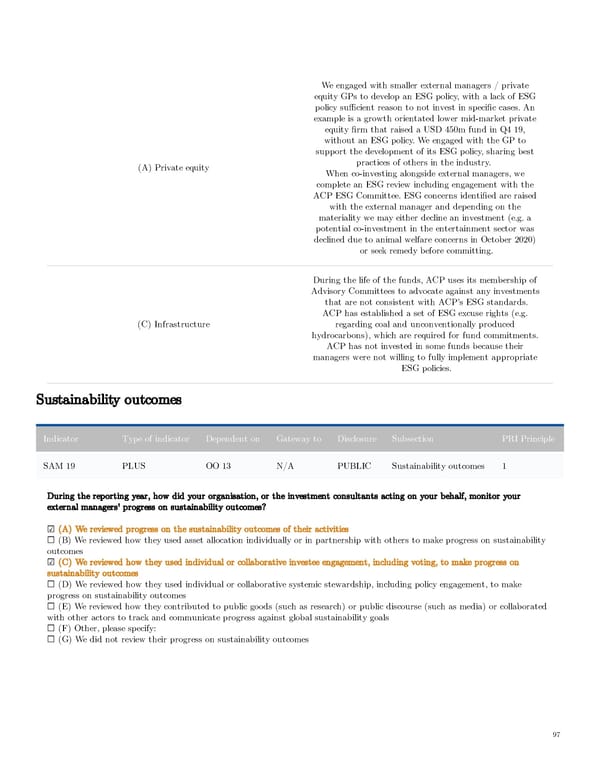We engaged with smaller external managers / private equity GPs to develop an ESG policy, with a lack of ESG policy sufficient reason to not invest in specific cases. An example is a growth orientated lower mid-market private equity firm that raised a USD 450m fund in Q4 19, without an ESG policy. We engaged with the GP to support the development of its ESG policy, sharing best practices of others in the industry. (A) Private equity When co-investing alongside external managers, we complete an ESG review including engagement with the ACP ESG Committee. ESG concerns identified are raised with the external manager and depending on the materiality we may either decline an investment (e.g. a potential co-investment in the entertainment sector was declined due to animal welfare concerns in October 2020) or seek remedy before committing. During the life of the funds, ACP uses its membership of Advisory Committees to advocate against any investments that are not consistent with ACP’s ESG standards. ACP has established a set of ESG excuse rights (e.g. (C) Infrastructure regarding coal and unconventionally produced hydrocarbons), which are required for fund commitments. ACP has not invested in some funds because their managers were not willing to fully implement appropriate ESG policies. Sustainability outcomes Indicator Type of indicator Dependent on Gateway to Disclosure Subsection PRI Principle SAM 19 PLUS OO 13 N/A PUBLIC Sustainability outcomes 1 During the reporting year, how did your organisation, or the investment consultants acting on your behalf, monitor your external managers' progress on sustainability outcomes? ☑ (A) We reviewed progress on the sustainability outcomes of their activities ☐ (B) We reviewed how they used asset allocation individually or in partnership with others to make progress on sustainability outcomes ☑ (C) We reviewed how they used individual or collaborative investee engagement, including voting, to make progress on sustainability outcomes ☐ (D) We reviewed how they used individual or collaborative systemic stewardship, including policy engagement, to make progress on sustainability outcomes ☐ (E) We reviewed how they contributed to public goods (such as research) or public discourse (such as media) or collaborated with other actors to track and communicate progress against global sustainability goals ☐ (F) Other, please specify: ☐ (G) We did not review their progress on sustainability outcomes 97
 AGI Public RI Report Page 96 Page 98
AGI Public RI Report Page 96 Page 98